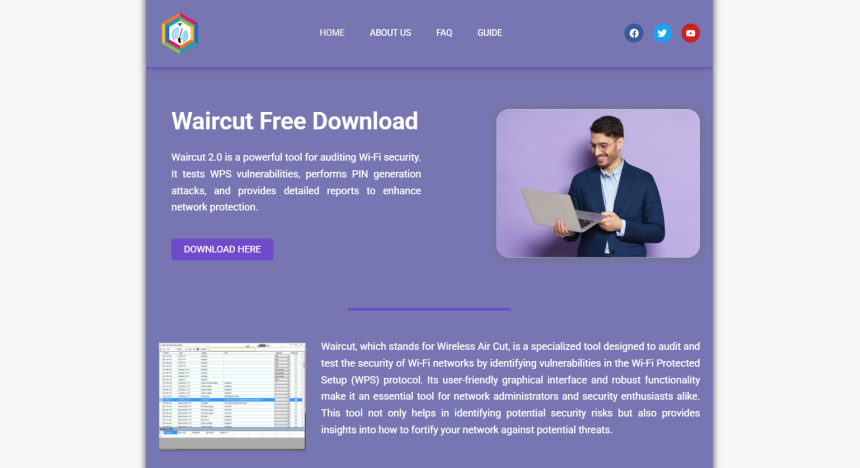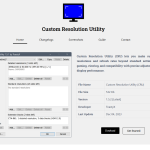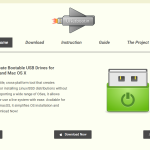Waircut is not just another Wi-Fi auditing tool. It’s a sophisticated software solution developed for users who are serious about network security, especially when it comes to WPS (Wi-Fi Protected Setup) vulnerabilities. While many tools exist in the cybersecurity space, Waircut offers a unique blend of user accessibility, technical power, and detailed reporting that separates it from the rest.
Released under the GNU license and designed to run on Windows platforms, Waircut has rapidly gained traction among network testers, security professionals, and even everyday users concerned about their router security. Its interface might seem simple, but beneath the surface lies a complex tool capable of identifying critical weaknesses in wireless networks.
Built Specifically for WPS Vulnerability Audits
Unlike generic tools that touch on multiple aspects of Wi-Fi testing, Waircut zeroes in on WPS vulnerabilities, which are often overlooked by conventional security tools. Many routers ship with WPS enabled by default, exposing them to brute-force attacks or PIN guessing tactics. Waircut understands the technical nuances of WPS and was crafted to exploit its weaknesses in a legal and ethical context.
Its core strength lies in its use of various PIN algorithms, including known default keys and vendor-specific exploits. These help determine whether a target network can be breached through its WPS system. Waircut doesn’t just alert users to risks—it actively tests, simulates, and confirms vulnerabilities.
Compatible with Wireless Network Adapters
Another area where Waircut stands out is hardware compatibility. Many penetration testing tools struggle with limited driver support or complex setup processes. Waircut simplifies this by supporting a wide range of wireless adapters through the JumpStart application, which facilitates real-time PIN testing.
Users can test WPS connections with more accuracy when JumpStart properly recognizes their adapter. This synergy makes the tool more reliable during actual penetration tests. For people without Linux backgrounds or who find tools like Reaver or Aircrack-ng too complex, Waircut provides an easier alternative.
Simple GUI with Powerful Backend
Most wireless auditing tools require knowledge of command-line operations, which can be daunting for average users. Waircut bypasses this barrier with a clean, user-friendly interface that retains all the power of more complicated platforms.
The UI is intuitive. You simply scan for available networks, select a target, and initiate a WPS vulnerability test. All the heavy lifting happens behind the scenes, but the user remains in control, with real-time logs and progress updates.
Despite the visual simplicity, Waircut doesn’t skimp on depth. Behind the interface is a backend that’s able to:
- Enumerate available access points
- Attempt PIN-based authentication
- Use known vulnerable default PINs
- Generate custom PINs based on algorithms
- Deliver success/failure feedback with detailed info
Portable and Lightweight
Waircut is a portable application, meaning it doesn’t require installation. This is a massive plus for cybersecurity professionals who need flexibility and speed in the field. It can be carried on a USB stick and run on almost any Windows machine without administrative privileges or dependency conflicts.
This portability factor also ensures that users can conduct quick tests without bloating system memory or dealing with complex setups. The tool is lightweight, with a download size that fits easily even on modest storage media.
Open-Source and Transparent
Trust is essential in the cybersecurity world. Many tools are closed-source, leaving users uncertain about what the software is doing behind the scenes. Waircut operates under a free and open-source license, which allows independent code review, audits, and customizations.
Developers and researchers can inspect the code for themselves, ensure no backdoors exist, and even contribute to its evolution. Transparency builds trust, especially for professionals working in high-stakes environments. You’re not just using a black-box tool—you’re engaging with a community-driven project.
Advanced Reporting and Feedback
Waircut isn’t just a scanner—it’s a reporter. The software generates detailed logs and summaries after each scan or attack attempt. These logs include:
- Target network SSID and BSSID
- Signal strength
- WPS status (Locked/Unlocked)
- PIN used in the attack
- Success or failure results
- Estimated attack duration
This feedback helps users understand where their vulnerabilities lie. It also makes it easier to document findings for audits or technical reports. Waircut’s ability to produce this kind of feedback, especially through a GUI, is something rarely seen in other tools.
Runs on Windows with No Linux Required
Most advanced penetration tools are Linux-exclusive, making them inaccessible to many users who rely on Windows machines. Waircut is tailored for the Windows environment, bridging the gap between powerful Wi-Fi security tools and non-Linux users.
For individuals or businesses that prefer Windows-based infrastructure, this compatibility removes the need for virtual machines, dual-boot setups, or complicated emulators.
Frequent Updates and Active Community
Open-source tools are only as strong as their user base and contributors. Waircut benefits from a growing community of developers and ethical hackers who actively contribute to its development. Bug fixes, feature suggestions, and security improvements happen regularly.
Having a live GitHub repository ensures transparency in development. Users can track updates, raise issues, and even fork the project to create their own custom version.
This open development model also ensures Waircut remains relevant to modern security threats. As router vendors evolve, so too does Waircut.
Lightweight Compared to Full Pentesting Suites
Compared to massive toolkits like Kali Linux or Parrot OS, Waircut delivers laser-focused functionality without the overhead. You don’t need to sift through dozens of unrelated tools or install gigabytes of software just to test one router.
This minimalism is ideal for professionals who value efficiency. If your goal is to check a router’s WPS security quickly and accurately, Waircut accomplishes that without distraction.
Ethical Use for Real-World Scenarios
While it can certainly be used for penetration testing, Waircut emphasizes ethical use cases. IT departments, network administrators, and security auditors use Waircut to legally and responsibly test their own networks or those under contract.
Its ethical focus also means it avoids being labeled as “black hat” software. Its open-source nature, legal standing, and targeted capabilities make it one of the more trusted tools for real-world Wi-Fi diagnostics.
Use Cases in Real Environments
- Corporate Security Testing: IT teams can evaluate their routers’ exposure to WPS attacks, ensuring sensitive data is protected.
- Educational Training: Security students learn the real-world implications of default router settings through safe, controlled testing.
- Home Wi-Fi Checks: Average users can quickly assess whether their home networks are vulnerable.
- Bug Bounty Programs: Ethical hackers can verify and report vulnerabilities as part of responsible disclosure.
These scenarios showcase the versatility of Waircut, extending its utility far beyond basic curiosity or academic interest.
Comparison with Similar Tools
Aircrack-ng is one of the most popular wireless auditing tools, but it requires command-line expertise and focuses on WPA handshakes more than WPS vulnerabilities. Waircut fills that gap.
Reaver, another WPS cracker, is powerful but designed for Linux. It often needs compilation, patches, or special distros to function well. Waircut offers similar functionality in a much more accessible Windows package.
Wireshark, while invaluable for network packet analysis, doesn’t offer the targeted penetration capability that Waircut does.
Waircut’s biggest advantage lies in its focus, simplicity, and platform compatibility, making it the go-to choice for specific WPS vulnerability assessments.
Best Practices for Using Waircut
While Waircut makes testing easier, some best practices should be followed:
- Always get permission before testing a network
- Update the software regularly for new exploits and fixes
- Use supported adapters that work well with JumpStart
- Record logs and generate reports for each session
- Disable WPS on your router if vulnerabilities are found
These practices ensure responsible usage and help in professional documentation.
Final Thoughts
Waircut is a standout tool in the cybersecurity landscape, especially for those focusing on wireless security and WPS vulnerability assessments. What makes it different is not just its platform or feature set, but the way it bridges the gap between user-friendly design and deep technical capability.
Its Windows compatibility, open-source transparency, lightweight structure, and precise focus on WPS weaknesses make it the perfect choice for individuals and organizations alike. Whether you’re an IT professional auditing a corporate network or a home user checking router safety, Waircut offers the tools you need in a clean, accessible format.








